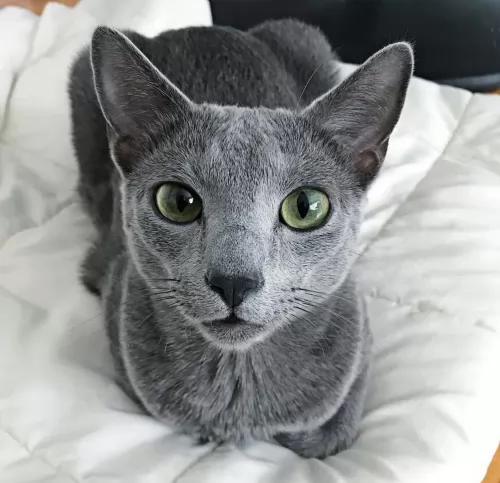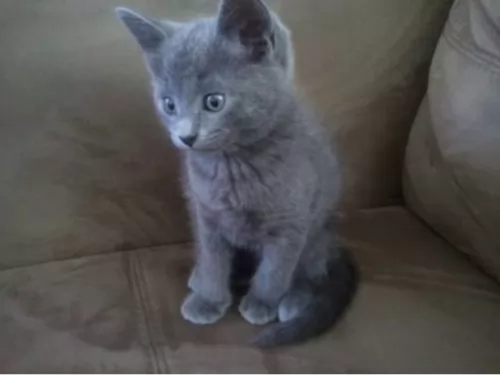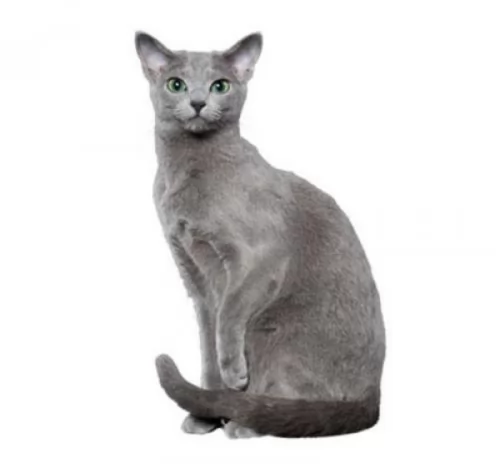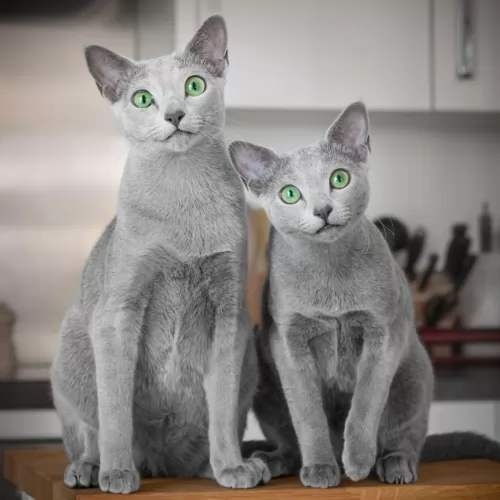 Petzlover
PetzloverBlue Russian is originated from Russia but Red Point Siamese is originated from United Kingdom. Both Blue Russian and Red Point Siamese are having almost same weight. Both Blue Russian and Red Point Siamese has same life span. Both Blue Russian and Red Point Siamese has same litter size. Both Blue Russian and Red Point Siamese requires Low Maintenance.
 The Blue Russian is a rare cat and not much is known about its origins, but it is believed that the cat comes from northern Russia.
The Blue Russian is a rare cat and not much is known about its origins, but it is believed that the cat comes from northern Russia.
The Cat Fanciers Association believes that the cat descended from cats kept by Russian Czars. Research tells us that there is no mention of the Blue Russian until the 19th century. The Russia Blue made its first public appearance in 1875, being exhibited at London’s Crystal Palace as the ‘Archangel Cat’.
By 1912, the Russia Bue was given its own classification after its introduction to the USA in the early 1900s.
The Siamese cat remains one of the most famous among the cat breeds. The Red Point is also known as the Flame Point Siamese cat. This breed of Siamese is rare.
It is believed that when the seal point Siamese breed was first introduced to the U.K in the 1930s they were bred with cats that carried these orange genes such as the tabby or tortoiseshell British shorthair cats.
Breeders wanted to produce a Siamese-style pointed cat in colors other than the traditional shades,
 The Russian Blue is a medium-sized cat with a long, finely-boned boy. It is a slender cat, but he appears larger because of his dense double coat.
The Russian Blue is a medium-sized cat with a long, finely-boned boy. It is a slender cat, but he appears larger because of his dense double coat.
He weighs in the region of 3 – 6kg. In spite of the dense and luxurious short silvery coat, the cat doesn’t shed much. The coat can in fact be a silvery shade to a dark slate grey. The eyes are a beautiful green, the ears widely spaced and slightly rounded at the top.
The Russian Blue is a sweet-tempered cat who becomes attached to his human owner and who will even follow his owner much like a dog.
This particular cat breed may be quite shy, but he becomes social around his family members and may even be reluctant to share time with strangers.
He also doesn’t mind spending some time alone if you have to work. Curious and intelligent the Russian Blue is somewhat reserved but he makes a great companion as he is sensitive to his owner's moods.
These cats are medium-sized, muscular cats and can weigh between 3 and 6kg. The neck is fairly long, the legs long and lean too.
These attractive cats have got reddish-gold points and with their sparkling blue almond-shaped eyes they really are a beautiful breed of cat. Like other Siamese kittens, the Redpoint kittens are also white when they are born. Variations of the Red Point Siamese cat should always have creamy-white bodies with the reddish-orange points.
The coat is short, thick, and silky. The points start emerging later on and deepen as the cat matures. You may see reddish freckling over the face, legs and paws as well as the tail.
The Redpoint Siamese is playful, social, friendly and intelligent. They love nothing more than to be around their human family but don’t warm too well to strangers.
They tend to become possessive over what they feel is theirs. They are also very vocal and have a different meow to express their feelings. These are definitely cats that don’t like being left alone for long periods of time. They want to be occupied and entertained and will need lots of stimulating toys to keep them occupied and exercised.
 Russian blue cats are such intelligent creatures and he will require some mental stimulation because of it.
Russian blue cats are such intelligent creatures and he will require some mental stimulation because of it.
He loves mealtimes, but remember to not overfeed him as this shortens his lifespan.
He is a vocal cat and will tell you when he is hungry or he wants to play.
These cats don’t like too many changes so keep things the same for him.
When you try to keep your lovely Blue Russian happy, you’ll be rewarded by having a fantastic feline companion.
If you’re looking for an exceptionally affectionate cat, then the Red Point Siamese is full of personality and will suit you very well as these cats are remarkably affectionate.
They always take an interest in what their humans are getting up to. They’re capable of forming strong bonds with their human family. They are also curious and intelligent and they can be taught a few tricks too.
They’re good-natured with their own human family but are not friendly with strangers.
They’re also energetic and agile and love to leap up onto a perch or your shoulders and survey his world from there.
If you want a cat that is an involved member of your family and an awesome companion, the Red Point Siamese will fit into this category superbly well.
The Red Point Siamese isn’t going to have any more cat diseases than any other cat. Any cat stands a better chance at good health when they have an exceptionally healthy diet.
Have your cats neutered or spayed to prevent unwanted kittens and to promote better health for your cats.
Watch out for diseases such as Progressive retinal atrophy (PRA), a genetic eye problem where the cells deteriorate. The disease, though not painful, can lead to blindness.
Obesity in cats, but particularly a slim, athletic cat such as the Red Point Siamese, can bring on a host of health issues. Overfeeding your cat isn’t a form of love but an irresponsible act. There are just too many dangers linked to being overweight to ignore. Excess weight can lead to joint problems as well as diabetes, and just getting rid of a little bit of weight can already result in increased overall good health.
Cat experts tell us that excess weight can shorten your pet’s life by 2 years. Get some tips on feeding your cat and keep him playfully active as well.
 Part of caring for a cat as a responsible pet owner comes from feeding your pet. The Russian Blue is a cat that enjoys his food so you will have to look out for overfeeding.
Part of caring for a cat as a responsible pet owner comes from feeding your pet. The Russian Blue is a cat that enjoys his food so you will have to look out for overfeeding.
A cat that is overweight can start developing joint problems and diabetes. Rather stick to scheduled meals so that you can know exactly what your feline pet is getting. Such a beautiful cat needs the best food there is to keep the coat shiny and healthy and to prevent illness.
Always read the food labels to ensure the best ingredients and the right portion sizes. Make sure your cat gets food that is meat protein-rich as a cat is a carnivore.
Water is another important part of your Blue Russian’s diet. Fresh cool water should be available for your cat night and day. Water bowls are good but a water fountain is a tantalizingly attractive way for your pet to be attracted to drinking more water.
Make sure that you rake up all your cat’s droppings from the litter box every day as the Russian Blue is a hygienic cat and wants a clean litter box. Make sure the litter box is in a nice quiet spot for your cat.
The cat has a dense coat but isn’t a heavy shedder and requires very little grooming.
Ensure a decent bed for your Bombay cat. Any soft cat bedding will do, and while some cats like a simple flat mattress-type bedding arrangement, other cats like the idea of getting into a bed that provides some privacy.
You just have to find yourself a decent pet shop because when you do, you’ll find a host of soft, warm, fully washable blankets and pillows for your pet. Once you’ve decided on the right bed and a nice quiet spot, your cat will have a complex issue sorted out as some cats can be fussy with their sleeping arrangments.
Make sure your cat is neutered or spayed to avoid unwanted kittens. Neutering offers health benefits, reducing the risk of different cancers. Your cat also no longer has the desire to fight over mates and territory.
With good care these cats cat reach 15 – 20 years of age.
The Red Point Siamese cat does shed but because it’s a low shedding cat, it becomes low maintenance. They usually shed in spring and again in the autumn. The short, easy-to-care-for coat can be brushed once a week.
Cats are strict carnivores, and just as a wild cat feeds on animal protein, so it is with a domesticated cat. They require a host of nutrients and only the best, high-quality foods contain these nutrients.
You get dry, semi-moist, and canned cat foods and the best commercial cat food manufacturers ensure that these foods have all the right balances of nutrients a cat needs.